Accounting Perspective and Research: Analysis of Accounting Theories
VerifiedAdded on 2020/05/11
|23
|5452
|431
Report
AI Summary
This report provides a comprehensive overview of accounting perspectives and research methodologies. It delves into key concepts such as accounting, system-based theories, sustainability reporting, non-regulatory disclosures, integrated reporting, and corporate social responsibility. The report then explores the concept of stakeholder engagement, outlining its importance and various approaches, including participation, consultation, and partnership. Furthermore, it analyzes the relevance of different accounting theories, specifically positive accounting theory, normative theory of accounting, and institutional theory, in fostering stakeholder engagement. The report also discusses the adequacy of primary and secondary data in research, highlighting their respective advantages and disadvantages. The analysis emphasizes the importance of primary data for ensuring the reliability, authenticity, and validity of research findings. Overall, the report provides valuable insights into the interconnectedness of accounting, stakeholder engagement, and research practices.
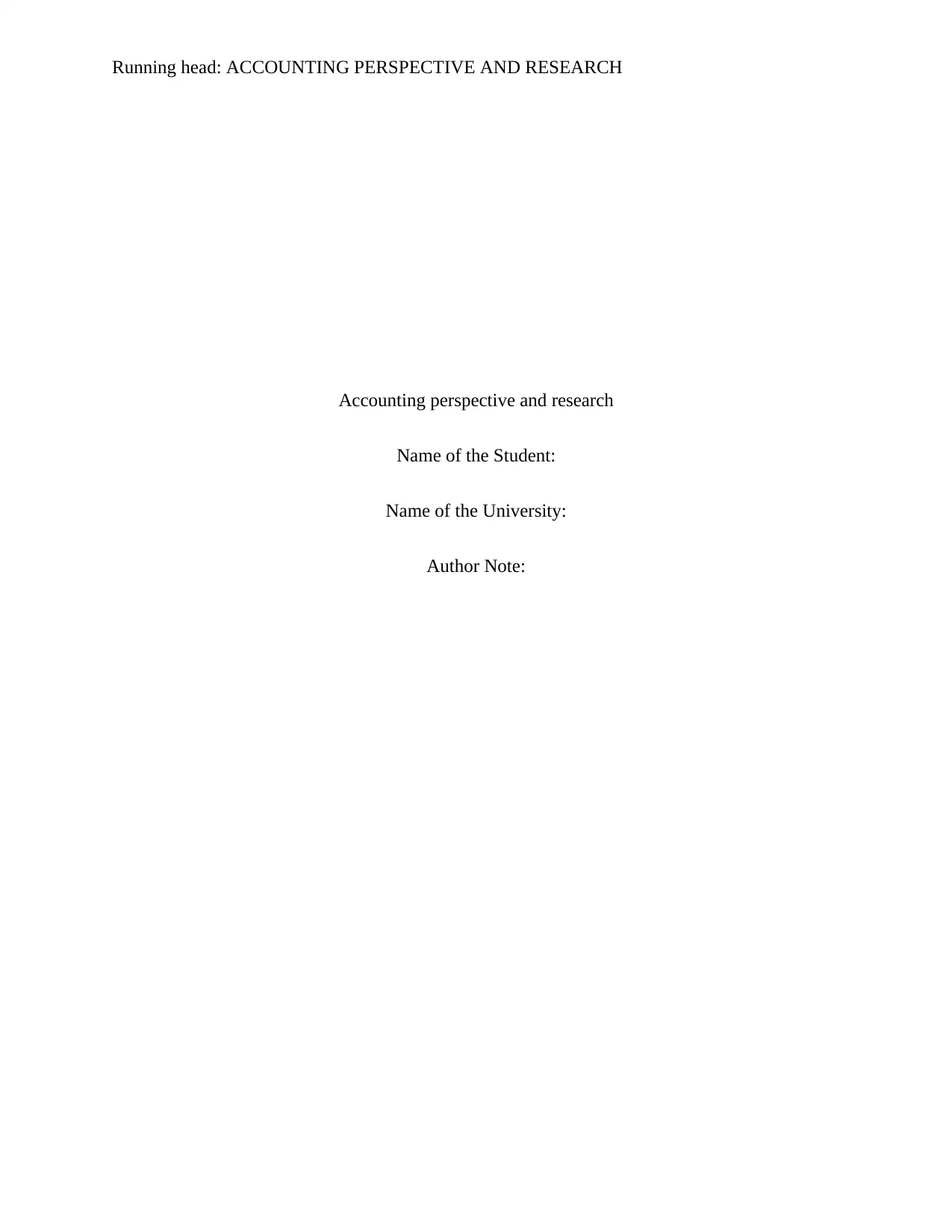
Running head: ACCOUNTING PERSPECTIVE AND RESEARCH
Accounting perspective and research
Name of the Student:
Name of the University:
Author Note:
Accounting perspective and research
Name of the Student:
Name of the University:
Author Note:
Paraphrase This Document
Need a fresh take? Get an instant paraphrase of this document with our AI Paraphraser
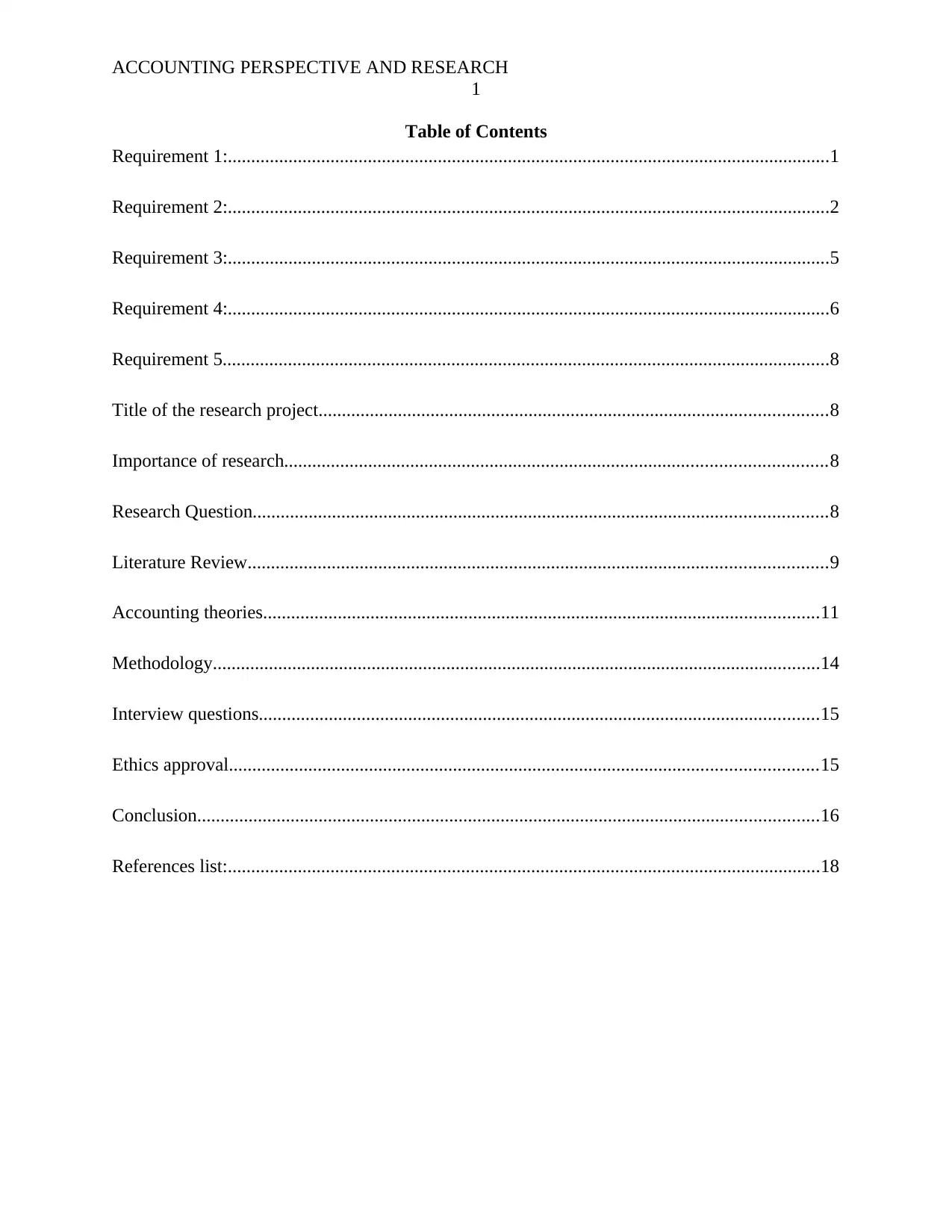
ACCOUNTING PERSPECTIVE AND RESEARCH
1
Table of Contents
Requirement 1:.................................................................................................................................1
Requirement 2:.................................................................................................................................2
Requirement 3:.................................................................................................................................5
Requirement 4:.................................................................................................................................6
Requirement 5..................................................................................................................................8
Title of the research project.............................................................................................................8
Importance of research....................................................................................................................8
Research Question...........................................................................................................................8
Literature Review............................................................................................................................9
Accounting theories.......................................................................................................................11
Methodology..................................................................................................................................14
Interview questions........................................................................................................................15
Ethics approval..............................................................................................................................15
Conclusion.....................................................................................................................................16
References list:...............................................................................................................................18
1
Table of Contents
Requirement 1:.................................................................................................................................1
Requirement 2:.................................................................................................................................2
Requirement 3:.................................................................................................................................5
Requirement 4:.................................................................................................................................6
Requirement 5..................................................................................................................................8
Title of the research project.............................................................................................................8
Importance of research....................................................................................................................8
Research Question...........................................................................................................................8
Literature Review............................................................................................................................9
Accounting theories.......................................................................................................................11
Methodology..................................................................................................................................14
Interview questions........................................................................................................................15
Ethics approval..............................................................................................................................15
Conclusion.....................................................................................................................................16
References list:...............................................................................................................................18
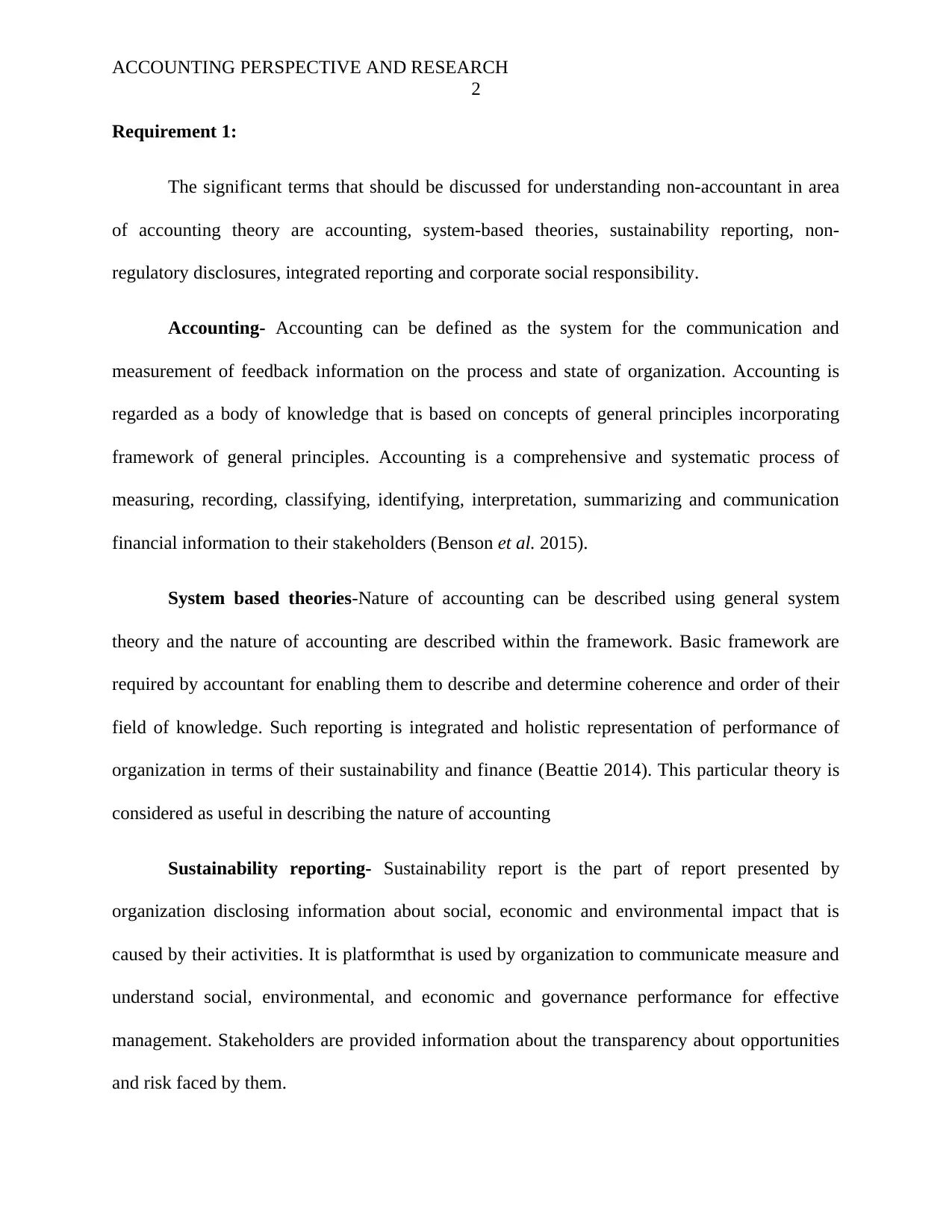
ACCOUNTING PERSPECTIVE AND RESEARCH
2
Requirement 1:
The significant terms that should be discussed for understanding non-accountant in area
of accounting theory are accounting, system-based theories, sustainability reporting, non-
regulatory disclosures, integrated reporting and corporate social responsibility.
Accounting- Accounting can be defined as the system for the communication and
measurement of feedback information on the process and state of organization. Accounting is
regarded as a body of knowledge that is based on concepts of general principles incorporating
framework of general principles. Accounting is a comprehensive and systematic process of
measuring, recording, classifying, identifying, interpretation, summarizing and communication
financial information to their stakeholders (Benson et al. 2015).
System based theories-Nature of accounting can be described using general system
theory and the nature of accounting are described within the framework. Basic framework are
required by accountant for enabling them to describe and determine coherence and order of their
field of knowledge. Such reporting is integrated and holistic representation of performance of
organization in terms of their sustainability and finance (Beattie 2014). This particular theory is
considered as useful in describing the nature of accounting
Sustainability reporting- Sustainability report is the part of report presented by
organization disclosing information about social, economic and environmental impact that is
caused by their activities. It is platformthat is used by organization to communicate measure and
understand social, environmental, and economic and governance performance for effective
management. Stakeholders are provided information about the transparency about opportunities
and risk faced by them.
2
Requirement 1:
The significant terms that should be discussed for understanding non-accountant in area
of accounting theory are accounting, system-based theories, sustainability reporting, non-
regulatory disclosures, integrated reporting and corporate social responsibility.
Accounting- Accounting can be defined as the system for the communication and
measurement of feedback information on the process and state of organization. Accounting is
regarded as a body of knowledge that is based on concepts of general principles incorporating
framework of general principles. Accounting is a comprehensive and systematic process of
measuring, recording, classifying, identifying, interpretation, summarizing and communication
financial information to their stakeholders (Benson et al. 2015).
System based theories-Nature of accounting can be described using general system
theory and the nature of accounting are described within the framework. Basic framework are
required by accountant for enabling them to describe and determine coherence and order of their
field of knowledge. Such reporting is integrated and holistic representation of performance of
organization in terms of their sustainability and finance (Beattie 2014). This particular theory is
considered as useful in describing the nature of accounting
Sustainability reporting- Sustainability report is the part of report presented by
organization disclosing information about social, economic and environmental impact that is
caused by their activities. It is platformthat is used by organization to communicate measure and
understand social, environmental, and economic and governance performance for effective
management. Stakeholders are provided information about the transparency about opportunities
and risk faced by them.
⊘ This is a preview!⊘
Do you want full access?
Subscribe today to unlock all pages.

Trusted by 1+ million students worldwide
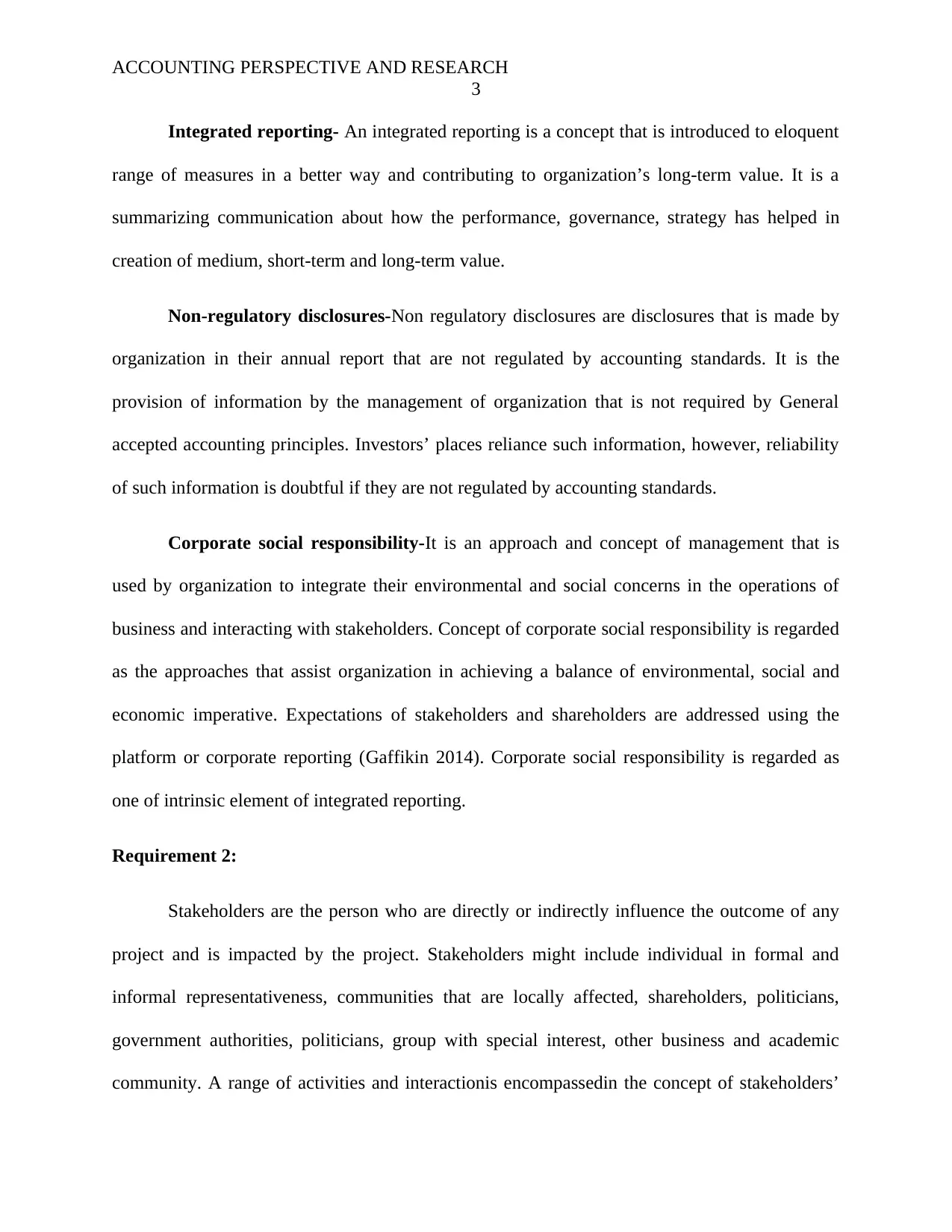
ACCOUNTING PERSPECTIVE AND RESEARCH
3
Integrated reporting- An integrated reporting is a concept that is introduced to eloquent
range of measures in a better way and contributing to organization’s long-term value. It is a
summarizing communication about how the performance, governance, strategy has helped in
creation of medium, short-term and long-term value.
Non-regulatory disclosures-Non regulatory disclosures are disclosures that is made by
organization in their annual report that are not regulated by accounting standards. It is the
provision of information by the management of organization that is not required by General
accepted accounting principles. Investors’ places reliance such information, however, reliability
of such information is doubtful if they are not regulated by accounting standards.
Corporate social responsibility-It is an approach and concept of management that is
used by organization to integrate their environmental and social concerns in the operations of
business and interacting with stakeholders. Concept of corporate social responsibility is regarded
as the approaches that assist organization in achieving a balance of environmental, social and
economic imperative. Expectations of stakeholders and shareholders are addressed using the
platform or corporate reporting (Gaffikin 2014). Corporate social responsibility is regarded as
one of intrinsic element of integrated reporting.
Requirement 2:
Stakeholders are the person who are directly or indirectly influence the outcome of any
project and is impacted by the project. Stakeholders might include individual in formal and
informal representativeness, communities that are locally affected, shareholders, politicians,
government authorities, politicians, group with special interest, other business and academic
community. A range of activities and interactionis encompassedin the concept of stakeholders’
3
Integrated reporting- An integrated reporting is a concept that is introduced to eloquent
range of measures in a better way and contributing to organization’s long-term value. It is a
summarizing communication about how the performance, governance, strategy has helped in
creation of medium, short-term and long-term value.
Non-regulatory disclosures-Non regulatory disclosures are disclosures that is made by
organization in their annual report that are not regulated by accounting standards. It is the
provision of information by the management of organization that is not required by General
accepted accounting principles. Investors’ places reliance such information, however, reliability
of such information is doubtful if they are not regulated by accounting standards.
Corporate social responsibility-It is an approach and concept of management that is
used by organization to integrate their environmental and social concerns in the operations of
business and interacting with stakeholders. Concept of corporate social responsibility is regarded
as the approaches that assist organization in achieving a balance of environmental, social and
economic imperative. Expectations of stakeholders and shareholders are addressed using the
platform or corporate reporting (Gaffikin 2014). Corporate social responsibility is regarded as
one of intrinsic element of integrated reporting.
Requirement 2:
Stakeholders are the person who are directly or indirectly influence the outcome of any
project and is impacted by the project. Stakeholders might include individual in formal and
informal representativeness, communities that are locally affected, shareholders, politicians,
government authorities, politicians, group with special interest, other business and academic
community. A range of activities and interactionis encompassedin the concept of stakeholders’
Paraphrase This Document
Need a fresh take? Get an instant paraphrase of this document with our AI Paraphraser
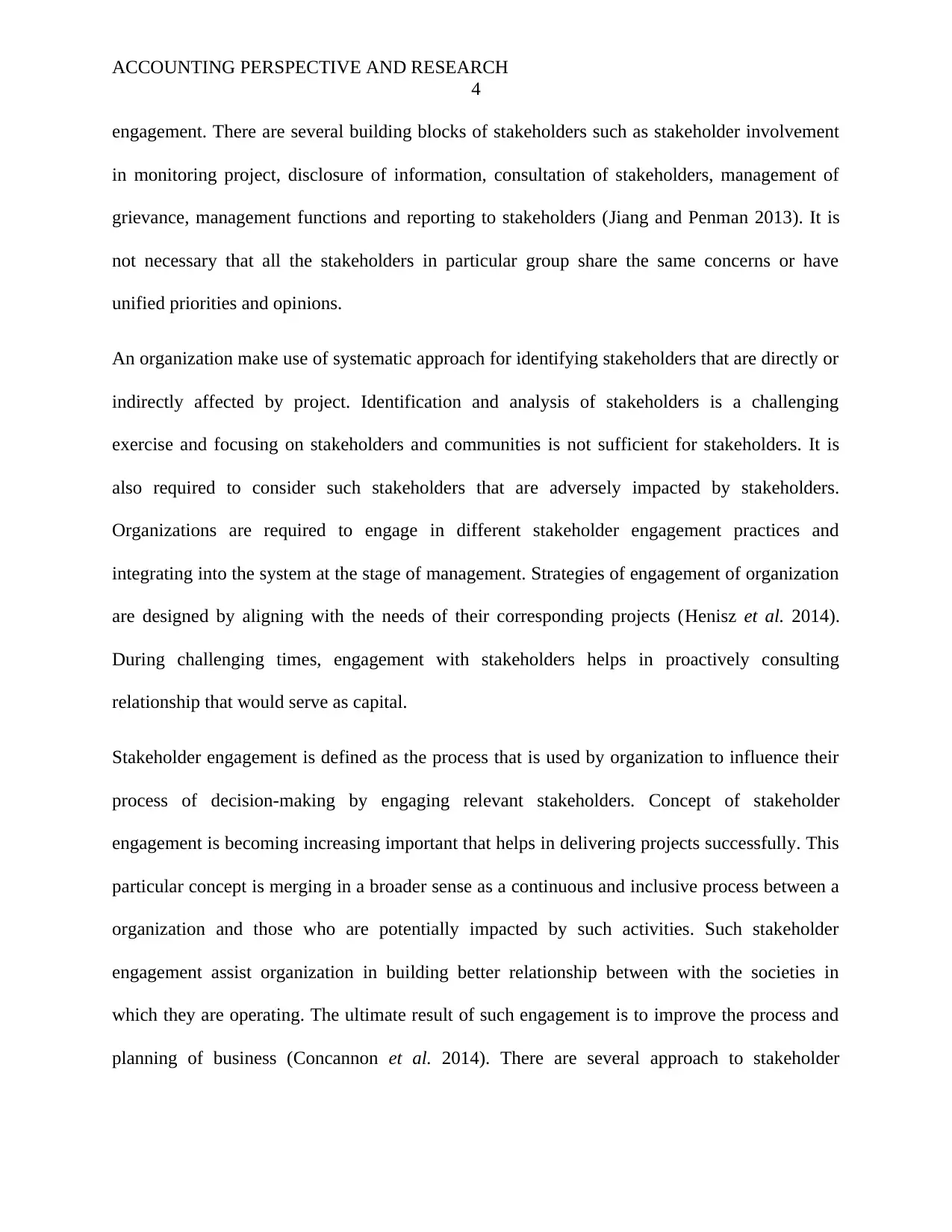
ACCOUNTING PERSPECTIVE AND RESEARCH
4
engagement. There are several building blocks of stakeholders such as stakeholder involvement
in monitoring project, disclosure of information, consultation of stakeholders, management of
grievance, management functions and reporting to stakeholders (Jiang and Penman 2013). It is
not necessary that all the stakeholders in particular group share the same concerns or have
unified priorities and opinions.
An organization make use of systematic approach for identifying stakeholders that are directly or
indirectly affected by project. Identification and analysis of stakeholders is a challenging
exercise and focusing on stakeholders and communities is not sufficient for stakeholders. It is
also required to consider such stakeholders that are adversely impacted by stakeholders.
Organizations are required to engage in different stakeholder engagement practices and
integrating into the system at the stage of management. Strategies of engagement of organization
are designed by aligning with the needs of their corresponding projects (Henisz et al. 2014).
During challenging times, engagement with stakeholders helps in proactively consulting
relationship that would serve as capital.
Stakeholder engagement is defined as the process that is used by organization to influence their
process of decision-making by engaging relevant stakeholders. Concept of stakeholder
engagement is becoming increasing important that helps in delivering projects successfully. This
particular concept is merging in a broader sense as a continuous and inclusive process between a
organization and those who are potentially impacted by such activities. Such stakeholder
engagement assist organization in building better relationship between with the societies in
which they are operating. The ultimate result of such engagement is to improve the process and
planning of business (Concannon et al. 2014). There are several approach to stakeholder
4
engagement. There are several building blocks of stakeholders such as stakeholder involvement
in monitoring project, disclosure of information, consultation of stakeholders, management of
grievance, management functions and reporting to stakeholders (Jiang and Penman 2013). It is
not necessary that all the stakeholders in particular group share the same concerns or have
unified priorities and opinions.
An organization make use of systematic approach for identifying stakeholders that are directly or
indirectly affected by project. Identification and analysis of stakeholders is a challenging
exercise and focusing on stakeholders and communities is not sufficient for stakeholders. It is
also required to consider such stakeholders that are adversely impacted by stakeholders.
Organizations are required to engage in different stakeholder engagement practices and
integrating into the system at the stage of management. Strategies of engagement of organization
are designed by aligning with the needs of their corresponding projects (Henisz et al. 2014).
During challenging times, engagement with stakeholders helps in proactively consulting
relationship that would serve as capital.
Stakeholder engagement is defined as the process that is used by organization to influence their
process of decision-making by engaging relevant stakeholders. Concept of stakeholder
engagement is becoming increasing important that helps in delivering projects successfully. This
particular concept is merging in a broader sense as a continuous and inclusive process between a
organization and those who are potentially impacted by such activities. Such stakeholder
engagement assist organization in building better relationship between with the societies in
which they are operating. The ultimate result of such engagement is to improve the process and
planning of business (Concannon et al. 2014). There are several approach to stakeholder
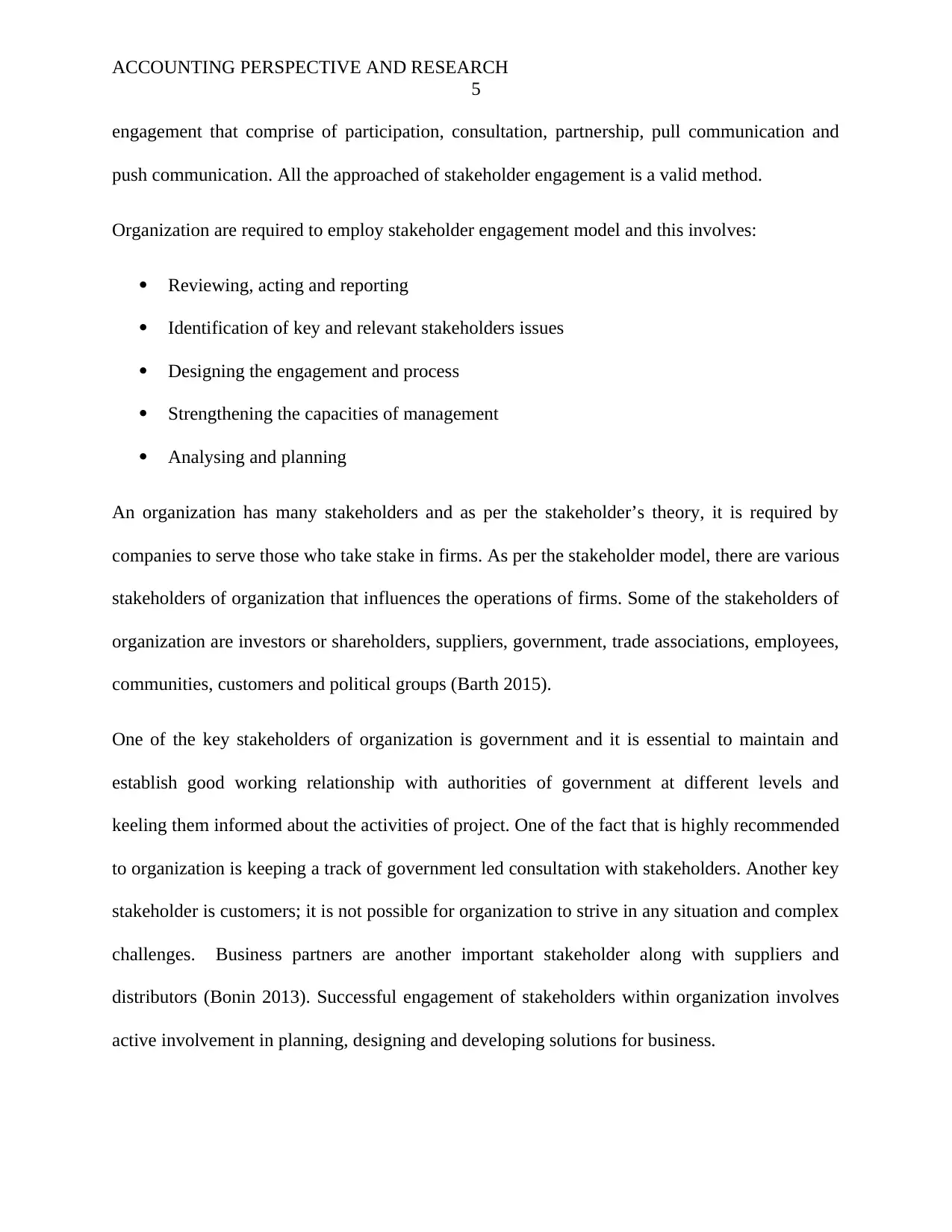
ACCOUNTING PERSPECTIVE AND RESEARCH
5
engagement that comprise of participation, consultation, partnership, pull communication and
push communication. All the approached of stakeholder engagement is a valid method.
Organization are required to employ stakeholder engagement model and this involves:
Reviewing, acting and reporting
Identification of key and relevant stakeholders issues
Designing the engagement and process
Strengthening the capacities of management
Analysing and planning
An organization has many stakeholders and as per the stakeholder’s theory, it is required by
companies to serve those who take stake in firms. As per the stakeholder model, there are various
stakeholders of organization that influences the operations of firms. Some of the stakeholders of
organization are investors or shareholders, suppliers, government, trade associations, employees,
communities, customers and political groups (Barth 2015).
One of the key stakeholders of organization is government and it is essential to maintain and
establish good working relationship with authorities of government at different levels and
keeling them informed about the activities of project. One of the fact that is highly recommended
to organization is keeping a track of government led consultation with stakeholders. Another key
stakeholder is customers; it is not possible for organization to strive in any situation and complex
challenges. Business partners are another important stakeholder along with suppliers and
distributors (Bonin 2013). Successful engagement of stakeholders within organization involves
active involvement in planning, designing and developing solutions for business.
5
engagement that comprise of participation, consultation, partnership, pull communication and
push communication. All the approached of stakeholder engagement is a valid method.
Organization are required to employ stakeholder engagement model and this involves:
Reviewing, acting and reporting
Identification of key and relevant stakeholders issues
Designing the engagement and process
Strengthening the capacities of management
Analysing and planning
An organization has many stakeholders and as per the stakeholder’s theory, it is required by
companies to serve those who take stake in firms. As per the stakeholder model, there are various
stakeholders of organization that influences the operations of firms. Some of the stakeholders of
organization are investors or shareholders, suppliers, government, trade associations, employees,
communities, customers and political groups (Barth 2015).
One of the key stakeholders of organization is government and it is essential to maintain and
establish good working relationship with authorities of government at different levels and
keeling them informed about the activities of project. One of the fact that is highly recommended
to organization is keeping a track of government led consultation with stakeholders. Another key
stakeholder is customers; it is not possible for organization to strive in any situation and complex
challenges. Business partners are another important stakeholder along with suppliers and
distributors (Bonin 2013). Successful engagement of stakeholders within organization involves
active involvement in planning, designing and developing solutions for business.
⊘ This is a preview!⊘
Do you want full access?
Subscribe today to unlock all pages.

Trusted by 1+ million students worldwide
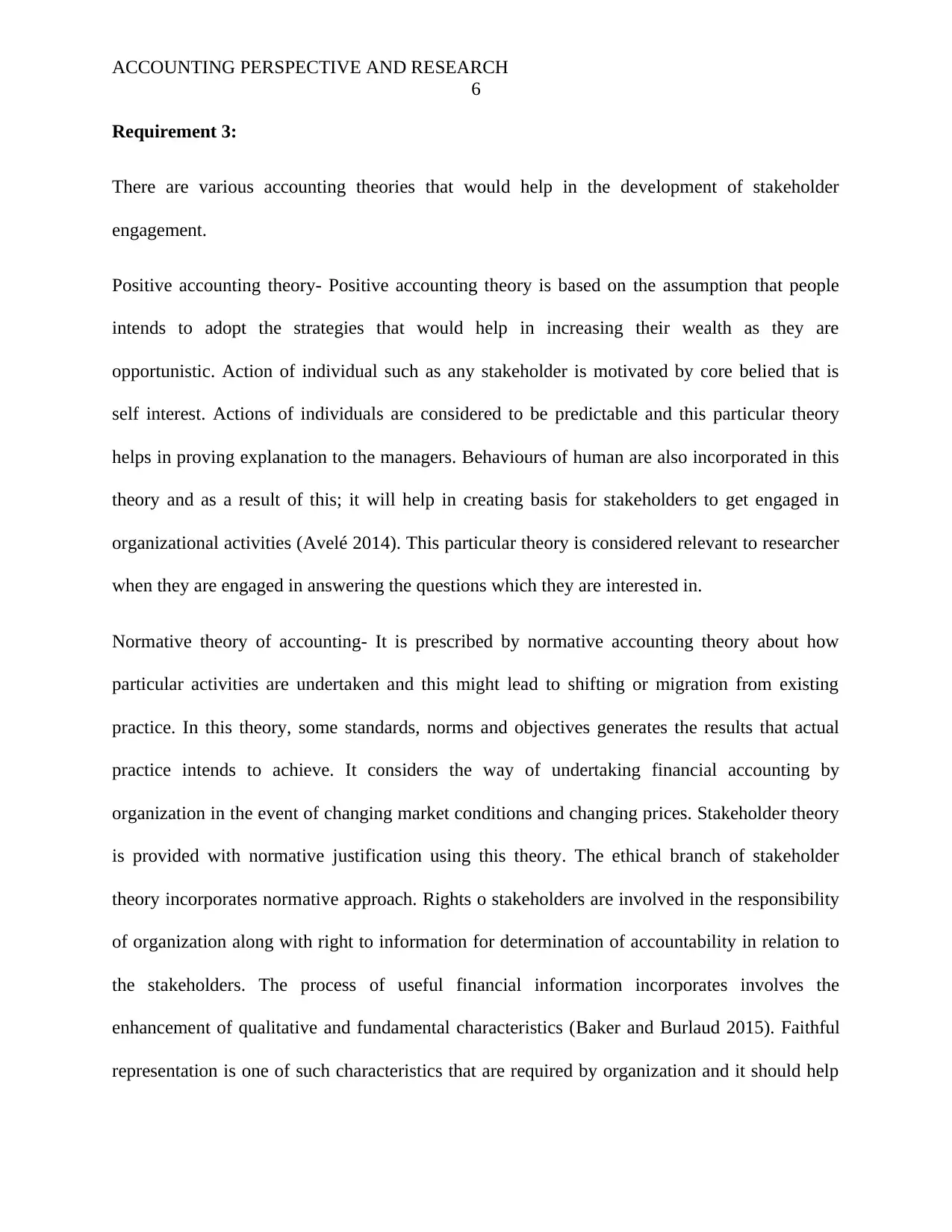
ACCOUNTING PERSPECTIVE AND RESEARCH
6
Requirement 3:
There are various accounting theories that would help in the development of stakeholder
engagement.
Positive accounting theory- Positive accounting theory is based on the assumption that people
intends to adopt the strategies that would help in increasing their wealth as they are
opportunistic. Action of individual such as any stakeholder is motivated by core belied that is
self interest. Actions of individuals are considered to be predictable and this particular theory
helps in proving explanation to the managers. Behaviours of human are also incorporated in this
theory and as a result of this; it will help in creating basis for stakeholders to get engaged in
organizational activities (Avelé 2014). This particular theory is considered relevant to researcher
when they are engaged in answering the questions which they are interested in.
Normative theory of accounting- It is prescribed by normative accounting theory about how
particular activities are undertaken and this might lead to shifting or migration from existing
practice. In this theory, some standards, norms and objectives generates the results that actual
practice intends to achieve. It considers the way of undertaking financial accounting by
organization in the event of changing market conditions and changing prices. Stakeholder theory
is provided with normative justification using this theory. The ethical branch of stakeholder
theory incorporates normative approach. Rights o stakeholders are involved in the responsibility
of organization along with right to information for determination of accountability in relation to
the stakeholders. The process of useful financial information incorporates involves the
enhancement of qualitative and fundamental characteristics (Baker and Burlaud 2015). Faithful
representation is one of such characteristics that are required by organization and it should help
6
Requirement 3:
There are various accounting theories that would help in the development of stakeholder
engagement.
Positive accounting theory- Positive accounting theory is based on the assumption that people
intends to adopt the strategies that would help in increasing their wealth as they are
opportunistic. Action of individual such as any stakeholder is motivated by core belied that is
self interest. Actions of individuals are considered to be predictable and this particular theory
helps in proving explanation to the managers. Behaviours of human are also incorporated in this
theory and as a result of this; it will help in creating basis for stakeholders to get engaged in
organizational activities (Avelé 2014). This particular theory is considered relevant to researcher
when they are engaged in answering the questions which they are interested in.
Normative theory of accounting- It is prescribed by normative accounting theory about how
particular activities are undertaken and this might lead to shifting or migration from existing
practice. In this theory, some standards, norms and objectives generates the results that actual
practice intends to achieve. It considers the way of undertaking financial accounting by
organization in the event of changing market conditions and changing prices. Stakeholder theory
is provided with normative justification using this theory. The ethical branch of stakeholder
theory incorporates normative approach. Rights o stakeholders are involved in the responsibility
of organization along with right to information for determination of accountability in relation to
the stakeholders. The process of useful financial information incorporates involves the
enhancement of qualitative and fundamental characteristics (Baker and Burlaud 2015). Faithful
representation is one of such characteristics that are required by organization and it should help
Paraphrase This Document
Need a fresh take? Get an instant paraphrase of this document with our AI Paraphraser
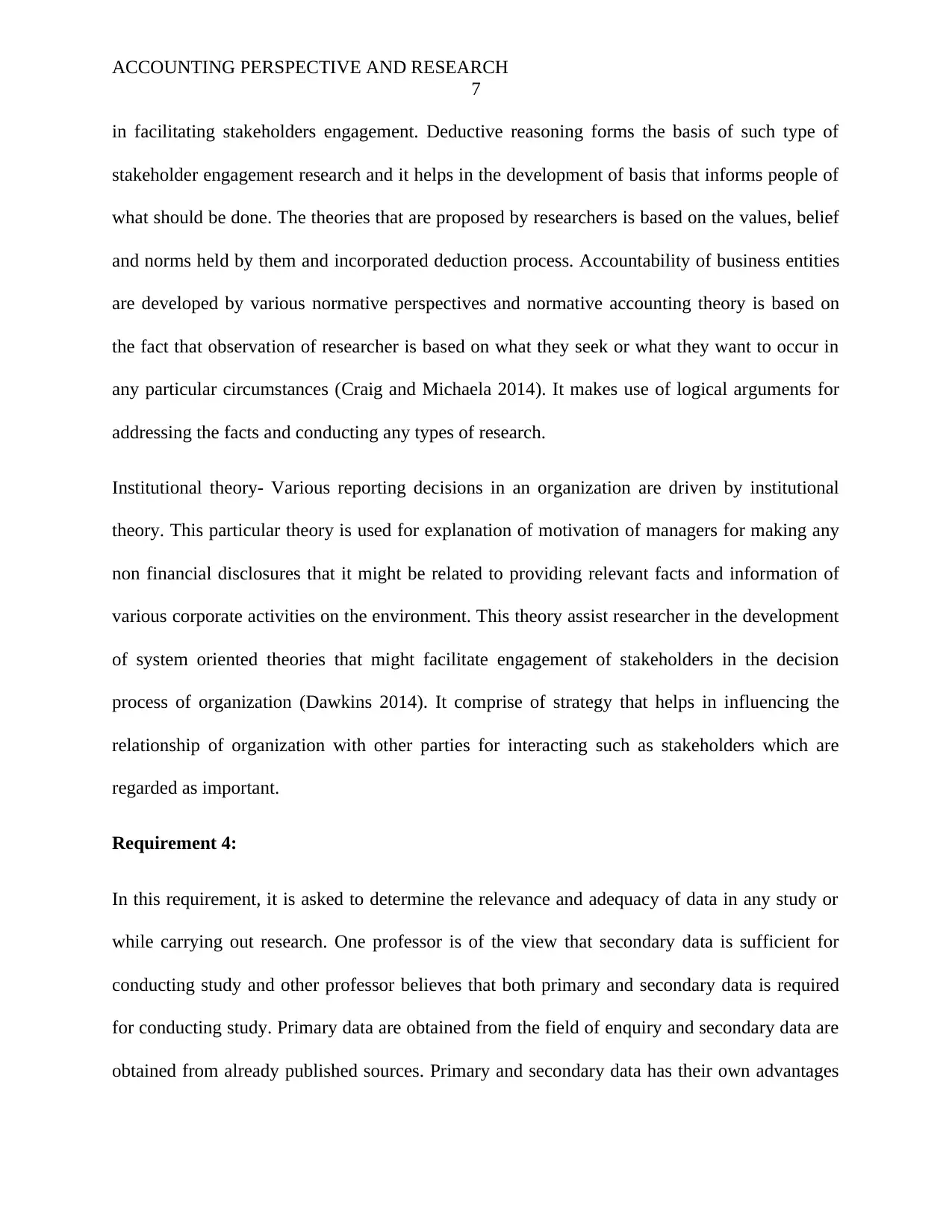
ACCOUNTING PERSPECTIVE AND RESEARCH
7
in facilitating stakeholders engagement. Deductive reasoning forms the basis of such type of
stakeholder engagement research and it helps in the development of basis that informs people of
what should be done. The theories that are proposed by researchers is based on the values, belief
and norms held by them and incorporated deduction process. Accountability of business entities
are developed by various normative perspectives and normative accounting theory is based on
the fact that observation of researcher is based on what they seek or what they want to occur in
any particular circumstances (Craig and Michaela 2014). It makes use of logical arguments for
addressing the facts and conducting any types of research.
Institutional theory- Various reporting decisions in an organization are driven by institutional
theory. This particular theory is used for explanation of motivation of managers for making any
non financial disclosures that it might be related to providing relevant facts and information of
various corporate activities on the environment. This theory assist researcher in the development
of system oriented theories that might facilitate engagement of stakeholders in the decision
process of organization (Dawkins 2014). It comprise of strategy that helps in influencing the
relationship of organization with other parties for interacting such as stakeholders which are
regarded as important.
Requirement 4:
In this requirement, it is asked to determine the relevance and adequacy of data in any study or
while carrying out research. One professor is of the view that secondary data is sufficient for
conducting study and other professor believes that both primary and secondary data is required
for conducting study. Primary data are obtained from the field of enquiry and secondary data are
obtained from already published sources. Primary and secondary data has their own advantages
7
in facilitating stakeholders engagement. Deductive reasoning forms the basis of such type of
stakeholder engagement research and it helps in the development of basis that informs people of
what should be done. The theories that are proposed by researchers is based on the values, belief
and norms held by them and incorporated deduction process. Accountability of business entities
are developed by various normative perspectives and normative accounting theory is based on
the fact that observation of researcher is based on what they seek or what they want to occur in
any particular circumstances (Craig and Michaela 2014). It makes use of logical arguments for
addressing the facts and conducting any types of research.
Institutional theory- Various reporting decisions in an organization are driven by institutional
theory. This particular theory is used for explanation of motivation of managers for making any
non financial disclosures that it might be related to providing relevant facts and information of
various corporate activities on the environment. This theory assist researcher in the development
of system oriented theories that might facilitate engagement of stakeholders in the decision
process of organization (Dawkins 2014). It comprise of strategy that helps in influencing the
relationship of organization with other parties for interacting such as stakeholders which are
regarded as important.
Requirement 4:
In this requirement, it is asked to determine the relevance and adequacy of data in any study or
while carrying out research. One professor is of the view that secondary data is sufficient for
conducting study and other professor believes that both primary and secondary data is required
for conducting study. Primary data are obtained from the field of enquiry and secondary data are
obtained from already published sources. Primary and secondary data has their own advantages
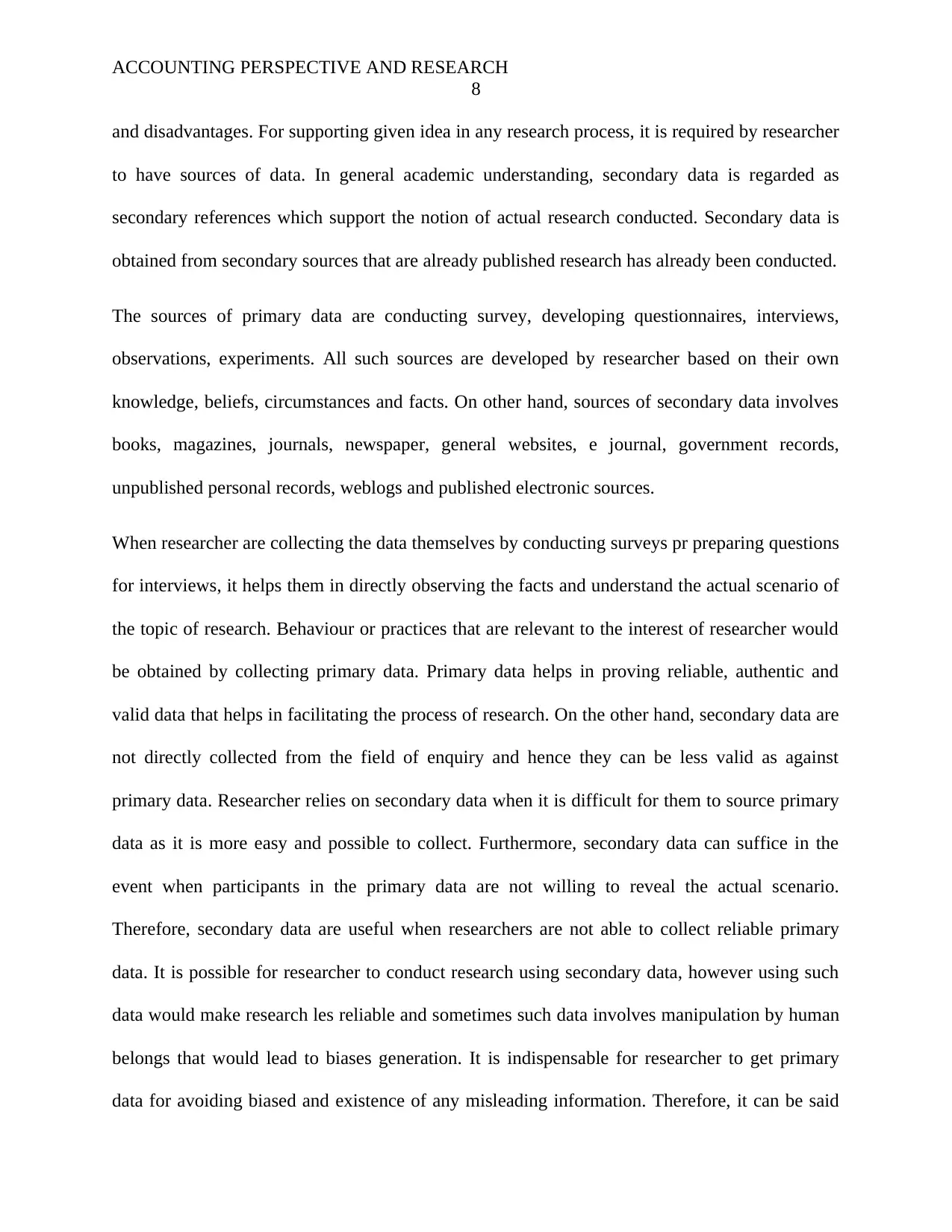
ACCOUNTING PERSPECTIVE AND RESEARCH
8
and disadvantages. For supporting given idea in any research process, it is required by researcher
to have sources of data. In general academic understanding, secondary data is regarded as
secondary references which support the notion of actual research conducted. Secondary data is
obtained from secondary sources that are already published research has already been conducted.
The sources of primary data are conducting survey, developing questionnaires, interviews,
observations, experiments. All such sources are developed by researcher based on their own
knowledge, beliefs, circumstances and facts. On other hand, sources of secondary data involves
books, magazines, journals, newspaper, general websites, e journal, government records,
unpublished personal records, weblogs and published electronic sources.
When researcher are collecting the data themselves by conducting surveys pr preparing questions
for interviews, it helps them in directly observing the facts and understand the actual scenario of
the topic of research. Behaviour or practices that are relevant to the interest of researcher would
be obtained by collecting primary data. Primary data helps in proving reliable, authentic and
valid data that helps in facilitating the process of research. On the other hand, secondary data are
not directly collected from the field of enquiry and hence they can be less valid as against
primary data. Researcher relies on secondary data when it is difficult for them to source primary
data as it is more easy and possible to collect. Furthermore, secondary data can suffice in the
event when participants in the primary data are not willing to reveal the actual scenario.
Therefore, secondary data are useful when researchers are not able to collect reliable primary
data. It is possible for researcher to conduct research using secondary data, however using such
data would make research les reliable and sometimes such data involves manipulation by human
belongs that would lead to biases generation. It is indispensable for researcher to get primary
data for avoiding biased and existence of any misleading information. Therefore, it can be said
8
and disadvantages. For supporting given idea in any research process, it is required by researcher
to have sources of data. In general academic understanding, secondary data is regarded as
secondary references which support the notion of actual research conducted. Secondary data is
obtained from secondary sources that are already published research has already been conducted.
The sources of primary data are conducting survey, developing questionnaires, interviews,
observations, experiments. All such sources are developed by researcher based on their own
knowledge, beliefs, circumstances and facts. On other hand, sources of secondary data involves
books, magazines, journals, newspaper, general websites, e journal, government records,
unpublished personal records, weblogs and published electronic sources.
When researcher are collecting the data themselves by conducting surveys pr preparing questions
for interviews, it helps them in directly observing the facts and understand the actual scenario of
the topic of research. Behaviour or practices that are relevant to the interest of researcher would
be obtained by collecting primary data. Primary data helps in proving reliable, authentic and
valid data that helps in facilitating the process of research. On the other hand, secondary data are
not directly collected from the field of enquiry and hence they can be less valid as against
primary data. Researcher relies on secondary data when it is difficult for them to source primary
data as it is more easy and possible to collect. Furthermore, secondary data can suffice in the
event when participants in the primary data are not willing to reveal the actual scenario.
Therefore, secondary data are useful when researchers are not able to collect reliable primary
data. It is possible for researcher to conduct research using secondary data, however using such
data would make research les reliable and sometimes such data involves manipulation by human
belongs that would lead to biases generation. It is indispensable for researcher to get primary
data for avoiding biased and existence of any misleading information. Therefore, it can be said
⊘ This is a preview!⊘
Do you want full access?
Subscribe today to unlock all pages.

Trusted by 1+ million students worldwide
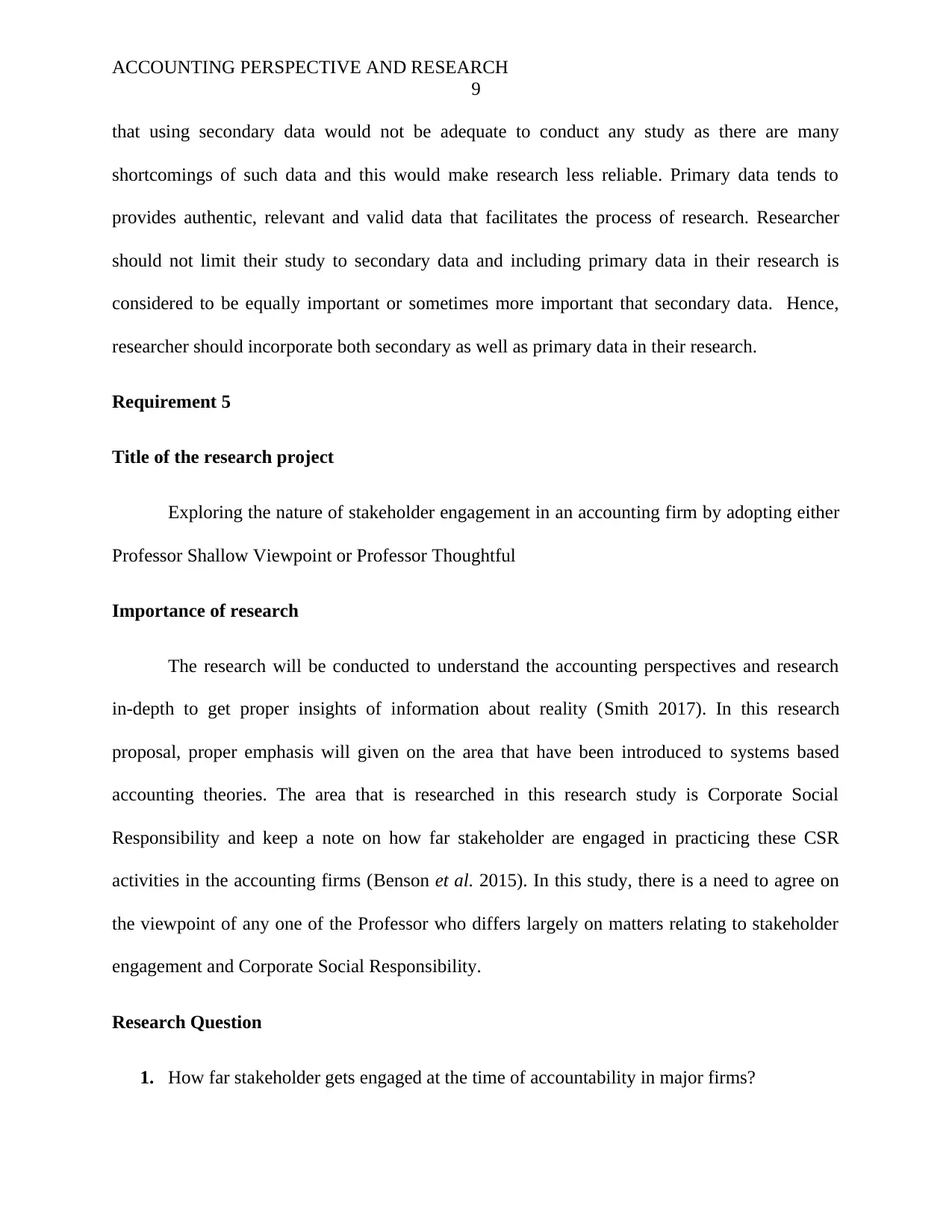
ACCOUNTING PERSPECTIVE AND RESEARCH
9
that using secondary data would not be adequate to conduct any study as there are many
shortcomings of such data and this would make research less reliable. Primary data tends to
provides authentic, relevant and valid data that facilitates the process of research. Researcher
should not limit their study to secondary data and including primary data in their research is
considered to be equally important or sometimes more important that secondary data. Hence,
researcher should incorporate both secondary as well as primary data in their research.
Requirement 5
Title of the research project
Exploring the nature of stakeholder engagement in an accounting firm by adopting either
Professor Shallow Viewpoint or Professor Thoughtful
Importance of research
The research will be conducted to understand the accounting perspectives and research
in-depth to get proper insights of information about reality (Smith 2017). In this research
proposal, proper emphasis will given on the area that have been introduced to systems based
accounting theories. The area that is researched in this research study is Corporate Social
Responsibility and keep a note on how far stakeholder are engaged in practicing these CSR
activities in the accounting firms (Benson et al. 2015). In this study, there is a need to agree on
the viewpoint of any one of the Professor who differs largely on matters relating to stakeholder
engagement and Corporate Social Responsibility.
Research Question
1. How far stakeholder gets engaged at the time of accountability in major firms?
9
that using secondary data would not be adequate to conduct any study as there are many
shortcomings of such data and this would make research less reliable. Primary data tends to
provides authentic, relevant and valid data that facilitates the process of research. Researcher
should not limit their study to secondary data and including primary data in their research is
considered to be equally important or sometimes more important that secondary data. Hence,
researcher should incorporate both secondary as well as primary data in their research.
Requirement 5
Title of the research project
Exploring the nature of stakeholder engagement in an accounting firm by adopting either
Professor Shallow Viewpoint or Professor Thoughtful
Importance of research
The research will be conducted to understand the accounting perspectives and research
in-depth to get proper insights of information about reality (Smith 2017). In this research
proposal, proper emphasis will given on the area that have been introduced to systems based
accounting theories. The area that is researched in this research study is Corporate Social
Responsibility and keep a note on how far stakeholder are engaged in practicing these CSR
activities in the accounting firms (Benson et al. 2015). In this study, there is a need to agree on
the viewpoint of any one of the Professor who differs largely on matters relating to stakeholder
engagement and Corporate Social Responsibility.
Research Question
1. How far stakeholder gets engaged at the time of accountability in major firms?
Paraphrase This Document
Need a fresh take? Get an instant paraphrase of this document with our AI Paraphraser
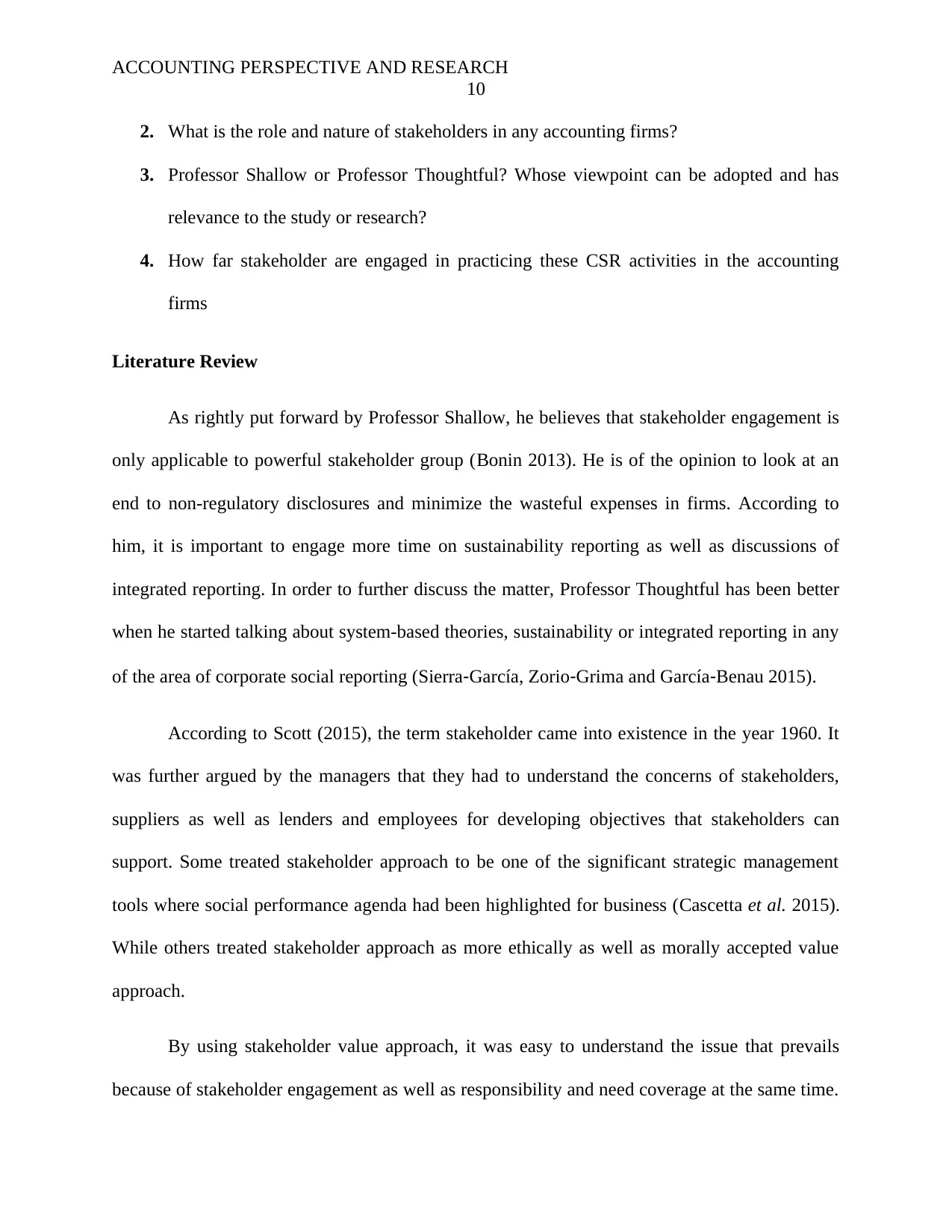
ACCOUNTING PERSPECTIVE AND RESEARCH
10
2. What is the role and nature of stakeholders in any accounting firms?
3. Professor Shallow or Professor Thoughtful? Whose viewpoint can be adopted and has
relevance to the study or research?
4. How far stakeholder are engaged in practicing these CSR activities in the accounting
firms
Literature Review
As rightly put forward by Professor Shallow, he believes that stakeholder engagement is
only applicable to powerful stakeholder group (Bonin 2013). He is of the opinion to look at an
end to non-regulatory disclosures and minimize the wasteful expenses in firms. According to
him, it is important to engage more time on sustainability reporting as well as discussions of
integrated reporting. In order to further discuss the matter, Professor Thoughtful has been better
when he started talking about system-based theories, sustainability or integrated reporting in any
of the area of corporate social reporting (Sierra‐García, Zorio‐Grima and García‐Benau 2015).
According to Scott (2015), the term stakeholder came into existence in the year 1960. It
was further argued by the managers that they had to understand the concerns of stakeholders,
suppliers as well as lenders and employees for developing objectives that stakeholders can
support. Some treated stakeholder approach to be one of the significant strategic management
tools where social performance agenda had been highlighted for business (Cascetta et al. 2015).
While others treated stakeholder approach as more ethically as well as morally accepted value
approach.
By using stakeholder value approach, it was easy to understand the issue that prevails
because of stakeholder engagement as well as responsibility and need coverage at the same time.
10
2. What is the role and nature of stakeholders in any accounting firms?
3. Professor Shallow or Professor Thoughtful? Whose viewpoint can be adopted and has
relevance to the study or research?
4. How far stakeholder are engaged in practicing these CSR activities in the accounting
firms
Literature Review
As rightly put forward by Professor Shallow, he believes that stakeholder engagement is
only applicable to powerful stakeholder group (Bonin 2013). He is of the opinion to look at an
end to non-regulatory disclosures and minimize the wasteful expenses in firms. According to
him, it is important to engage more time on sustainability reporting as well as discussions of
integrated reporting. In order to further discuss the matter, Professor Thoughtful has been better
when he started talking about system-based theories, sustainability or integrated reporting in any
of the area of corporate social reporting (Sierra‐García, Zorio‐Grima and García‐Benau 2015).
According to Scott (2015), the term stakeholder came into existence in the year 1960. It
was further argued by the managers that they had to understand the concerns of stakeholders,
suppliers as well as lenders and employees for developing objectives that stakeholders can
support. Some treated stakeholder approach to be one of the significant strategic management
tools where social performance agenda had been highlighted for business (Cascetta et al. 2015).
While others treated stakeholder approach as more ethically as well as morally accepted value
approach.
By using stakeholder value approach, it was easy to understand the issue that prevails
because of stakeholder engagement as well as responsibility and need coverage at the same time.
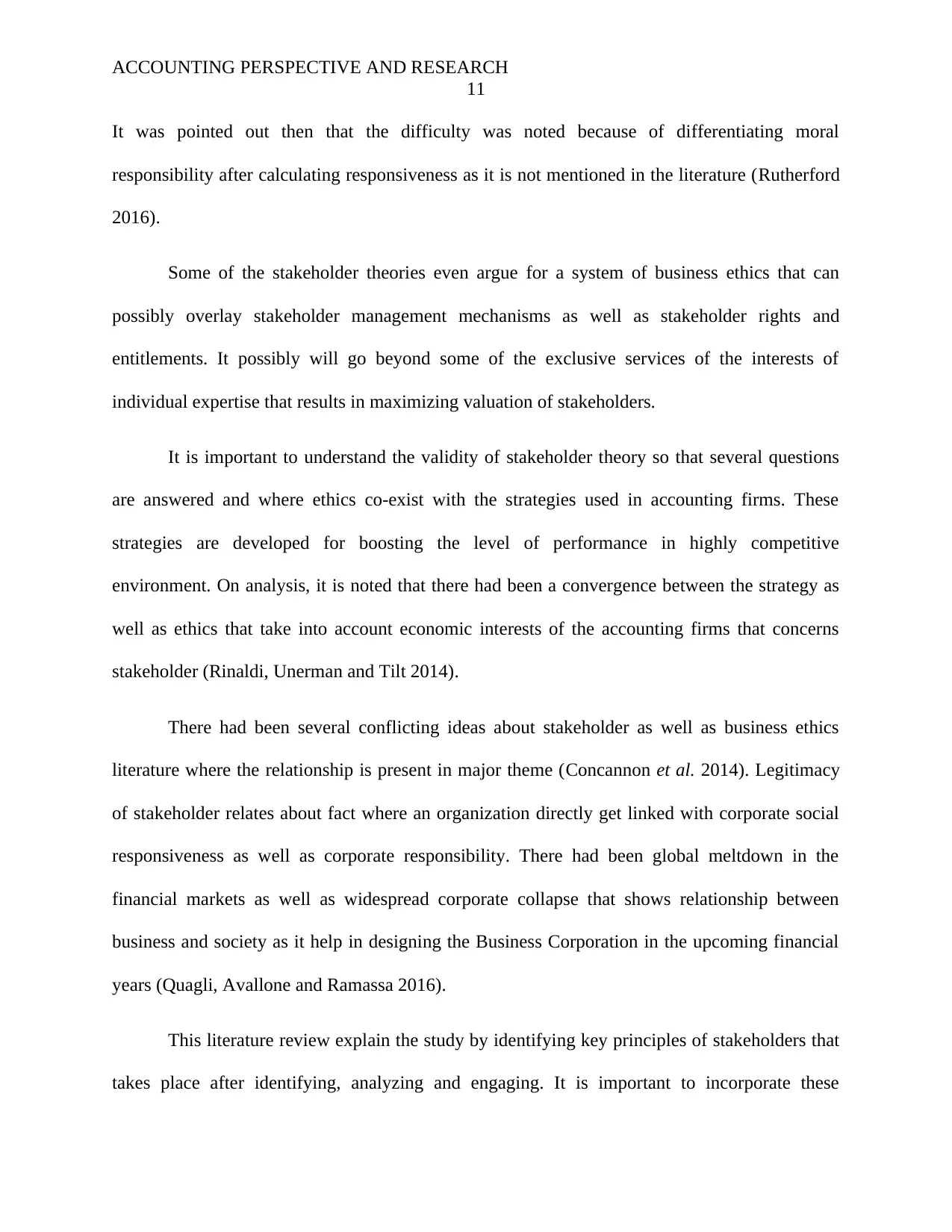
ACCOUNTING PERSPECTIVE AND RESEARCH
11
It was pointed out then that the difficulty was noted because of differentiating moral
responsibility after calculating responsiveness as it is not mentioned in the literature (Rutherford
2016).
Some of the stakeholder theories even argue for a system of business ethics that can
possibly overlay stakeholder management mechanisms as well as stakeholder rights and
entitlements. It possibly will go beyond some of the exclusive services of the interests of
individual expertise that results in maximizing valuation of stakeholders.
It is important to understand the validity of stakeholder theory so that several questions
are answered and where ethics co-exist with the strategies used in accounting firms. These
strategies are developed for boosting the level of performance in highly competitive
environment. On analysis, it is noted that there had been a convergence between the strategy as
well as ethics that take into account economic interests of the accounting firms that concerns
stakeholder (Rinaldi, Unerman and Tilt 2014).
There had been several conflicting ideas about stakeholder as well as business ethics
literature where the relationship is present in major theme (Concannon et al. 2014). Legitimacy
of stakeholder relates about fact where an organization directly get linked with corporate social
responsiveness as well as corporate responsibility. There had been global meltdown in the
financial markets as well as widespread corporate collapse that shows relationship between
business and society as it help in designing the Business Corporation in the upcoming financial
years (Quagli, Avallone and Ramassa 2016).
This literature review explain the study by identifying key principles of stakeholders that
takes place after identifying, analyzing and engaging. It is important to incorporate these
11
It was pointed out then that the difficulty was noted because of differentiating moral
responsibility after calculating responsiveness as it is not mentioned in the literature (Rutherford
2016).
Some of the stakeholder theories even argue for a system of business ethics that can
possibly overlay stakeholder management mechanisms as well as stakeholder rights and
entitlements. It possibly will go beyond some of the exclusive services of the interests of
individual expertise that results in maximizing valuation of stakeholders.
It is important to understand the validity of stakeholder theory so that several questions
are answered and where ethics co-exist with the strategies used in accounting firms. These
strategies are developed for boosting the level of performance in highly competitive
environment. On analysis, it is noted that there had been a convergence between the strategy as
well as ethics that take into account economic interests of the accounting firms that concerns
stakeholder (Rinaldi, Unerman and Tilt 2014).
There had been several conflicting ideas about stakeholder as well as business ethics
literature where the relationship is present in major theme (Concannon et al. 2014). Legitimacy
of stakeholder relates about fact where an organization directly get linked with corporate social
responsiveness as well as corporate responsibility. There had been global meltdown in the
financial markets as well as widespread corporate collapse that shows relationship between
business and society as it help in designing the Business Corporation in the upcoming financial
years (Quagli, Avallone and Ramassa 2016).
This literature review explain the study by identifying key principles of stakeholders that
takes place after identifying, analyzing and engaging. It is important to incorporate these
⊘ This is a preview!⊘
Do you want full access?
Subscribe today to unlock all pages.

Trusted by 1+ million students worldwide
1 out of 23
Related Documents
Your All-in-One AI-Powered Toolkit for Academic Success.
+13062052269
info@desklib.com
Available 24*7 on WhatsApp / Email
![[object Object]](/_next/static/media/star-bottom.7253800d.svg)
Unlock your academic potential
Copyright © 2020–2026 A2Z Services. All Rights Reserved. Developed and managed by ZUCOL.





